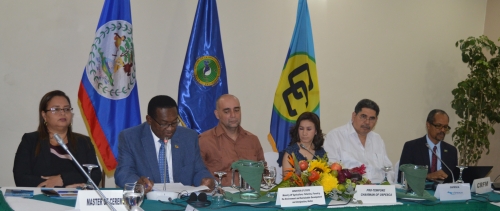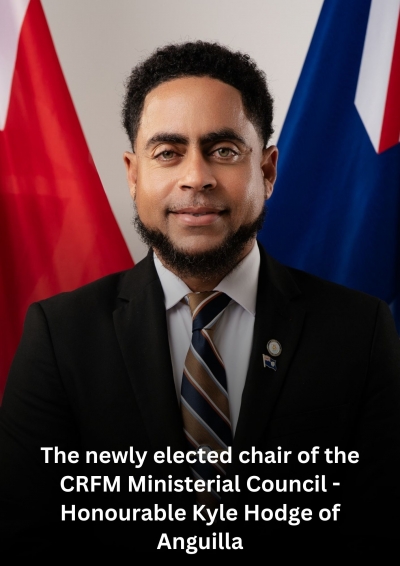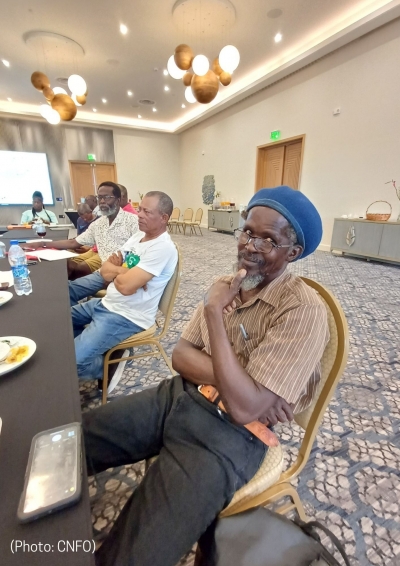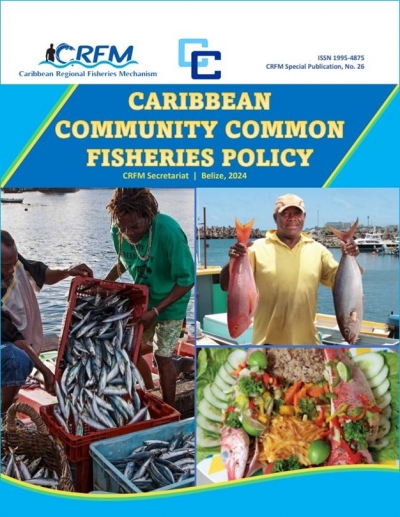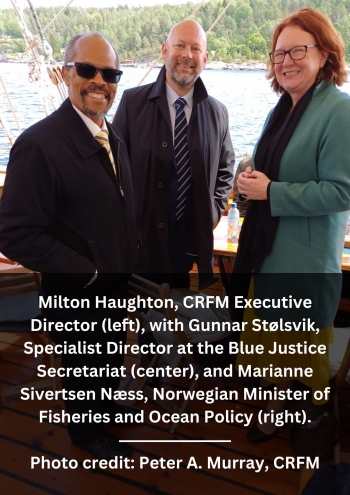BELIZE CITY, FRIDAY, 4 OCTOBER 2019 (CRFM)—After several hours of deliberation at their Second Joint Meeting held in Belize on Wednesday, 2 October 2019, Fisheries Ministers from Member States of the Caribbean Regional Fisheries Mechanism (CRFM) and the Organization for Fisheries and Aquaculture of the Central American Isthmus (OSPESCA) inked a milestone instrument. The “Declaration on CRFM-OSPESCA Cooperation for Sustainable Development of Fisheries and Aquaculture Resources” signals their resolve to solidify the cooperation birthed at their first joint meeting held in Belize 7 years earlier, in 2012.
Among the agreed areas of cooperation are: monitoring and managing Sargassum blooms which have been adversely affecting the region since 2011; the control of invasive species, with emphasis on the Pacific lionfish; and the development of small-scale fisheries to ensure the protection of livelihoods and food security. The renewed alliance will also support the implementation of fisheries management plans for shared stocks, such as spiny lobster, queen conch and migratory pelagic species; programmes on climate change adaptation and disaster risk management in fisheries and aquaculture; as well as ocean-based fisheries and aquaculture economic activities, including value chain development.
The CRFM and OSPESCA countries have, furthermore, pledged to develop coordinated positions on international processes, such as the listing of threatened and endangered species under CITES; fisheries subsidies negotiations led by the WTO; and the UN conference to develop a legally-binding agreement on conservation, management and sustainable use of biodiversity in areas beyond national jurisdiction.
Representatives from Grenada and Guatemala sign joint declaration (Photo: CRFM)
In signing the Joint Declaration, the Fisheries Ministers also approved the Second Joint CRFM-OSPESCA Action Plan (2020 to 2025), which is a 5-year roadmap to guide collaborative programmes and activities agreed in the declaration by the two sub-regional organisations.
Among the commitments made is that, “The CRFM and OSPESCA Secretariats and Member States will work together to strengthen cooperation to deter, prevent and eliminate IUU [Illegal, Unreported and Unregulated] fishing in the region.”
At the opening of the meeting, Keynote Speaker, Hon. Dr. Omar Figueroa, Belize’s Minister of State with responsibility for Fisheries, said: “IUU Fishing is undoubtedly causing damage to our fish populations in our countries, and we must continue to actively identify and implement tangible and effective actions on a bilateral or sub-regional level to curb these illicit activities.”
Prior to the meeting with OSPESCA, the CRFM Ministerial Council held its 9th Special Meeting, at which it approved the Regional Plan of Action on IUU Fishing for the Western Central Atlantic region, with a commitment to developing a CARICOM-specific Action Plan. The Jamaican delegation pointed out to their counterparts that IUU fishing recently forced them to impose a moratorium on their conch fishery, resulting in multi-million-dollar losses for the country, its export sector and fishers. Their hope is that the collaboration with OSPESCA will help to effectively prevent and deter IUU fishing in Caribbean waters.
Milton Haughton, Executive Director of the CRFM Secretariat, added that, “It is the recognition that we share a common interest and a common destiny in the sustainable use and protection of the Caribbean Sea and its living marine resources and ecosystems that inspires and underpins the partnership that is developing between the Caribbean and Central American sub-regions in fisheries and aquaculture.”
Hon. Eugene Hamilton, Chair of the CRFM Ministerial Council and Minister Responsible for Fisheries in Saint Kitts and Nevis, said: “It is predicted that 90% of the world’s fish protein will come from aquaculture by 2050.” He, consequently, urged the countries, generally regarded as small island developing states and coastal states, to work together to develop aquaculture.
Norma Lobo, General Director for the Development of Fisheries and Aquaculture, represented the Minister of Agriculture of El Salvador, Pro-Tempore Chairman of OSPESCA, at the meeting. In her brief remarks, she indicated that this was the first such meeting in which she has participated, and expressed her enthusiasm for learning more about the challenges faced by the region and, furthermore, working together to confront them.
Haughton expressed optimism that, “This growing strategic partnership between our countries, our fisheries institutions and our stakeholders in the fisheries and aquaculture sectors, will yield tangible mutual benefit from our collective experience, expertise and cooperation in addressing the common challenges we face.”
The UNDP-GEF Caribbean and North Brazil Shelf Large Marine Ecosystems (CLME+) Project provided financial support to facilitate the convening of the meeting in Belize City, Belize. It has also been providing support to the CRFM, OSPESCA, FAO/WECAFC, UN Environment and other regional organisations to strengthen arrangements for improved governance and management of the fisheries resources and marine environment of the region.
- Access more photos from the event’s album on CRFM’s Facebook page HERE.
- View the signed Declaration in English HERE. (Access Spanish version HERE.)
- View CRFM-OSPESCA Action Plan in English HERE. (Access Spanish version HERE.)


